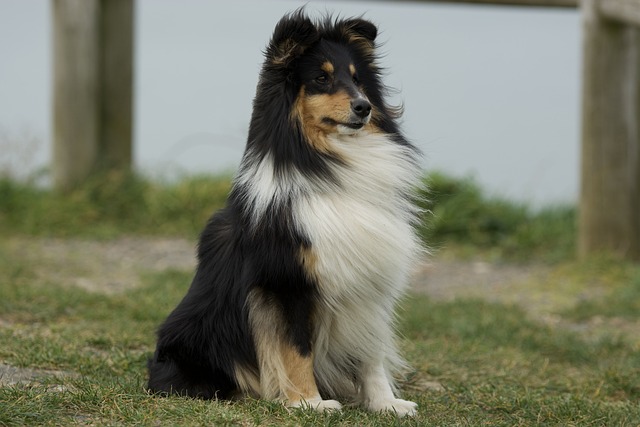


The Shetland Sheepdog, often affectionately called the "Sheltie," is a small to medium-sized herding dog known for its intelligence, agility, and affectionate nature. Originally bred for herding sheep on the rugged Shetland Islands of Scotland, Shelties are highly trainable, energetic, and loyal companions. They are often compared to the Rough Collie in appearance but are smaller and more compact. With their beautiful double coat and sharp, alert expression, Shelties are known for being excellent family pets, watchdogs, and competitors in dog sports such as agility and obedience.
The Shetland Sheepdog originated in the Shetland Islands, located off the northern coast of Scotland. The breed was developed to assist farmers with herding and guarding sheep in the harsh and rugged landscape of the islands. The Sheltie is believed to be a mix of several breeds, including the Border Collie, the Rough Collie, and possibly smaller local herding dogs. These dogs were used for herding livestock, as well as guarding property. Over time, the Shetland Sheepdog became known for its intelligence, agility, and herding instincts, which made it highly valuable to farmers. In the late 19th century, Shelties began to gain recognition as show dogs, and the breed was officially recognized by the American Kennel Club (AKC) in 1911. Since then, the Shetland Sheepdog has become a popular companion and working dog worldwide.
The Shetland Sheepdog has a graceful, athletic appearance with a compact, well-proportioned body. They typically stand between 13 to 16 inches tall at the shoulder and weigh between 15 to 25 pounds. Shelties have a distinctive double coat that is long and dense, with a soft, thick undercoat and a longer, harsher outer coat. Their coat comes in a variety of colors, including sable, tri-color (black, white, and tan), blue merle, and bi-black. They have a long, bushy tail, and their ears are triangular and semi-erect, giving them a keen, alert expression. The Sheltie’s face is typically characterized by a refined, yet strong appearance, with bright, almond-shaped eyes that give the dog a gentle, intelligent look. Despite their small to medium size, Shelties have a strong and agile build that makes them excellent at tasks requiring speed and dexterity.
The Shetland Sheepdog is known for being affectionate, loyal, and highly intelligent. They are extremely devoted to their families and tend to bond closely with their owners. Shelties are also known for their gentle, reserved nature with strangers, making them excellent watchdogs. They have a natural instinct to protect their family, though they are not aggressive. While they are generally friendly and good with children, Shelties may be reserved or shy around unfamiliar people and animals. They are particularly sensitive and respond well to positive reinforcement during training. Due to their herding background, Shelties can be highly energetic and need plenty of mental and physical stimulation to stay content. Their alertness and attentiveness make them good companions, though their herding instinct may lead them to "herd" children or other pets in the household.
The Shetland Sheepdog is an active and energetic breed that requires regular exercise to remain healthy and happy. As a herding dog, Shelties have a lot of energy and enjoy activities that engage both their mind and body. Daily walks, playtime in the yard, and opportunities to run are essential for keeping them fit and satisfied. Shelties excel in dog sports, including agility, obedience, flyball, and herding trials, which allow them to channel their energy and intelligence in a productive way. They also enjoy mental stimulation, such as puzzle toys, learning new tricks, and obedience training. Without enough exercise and mental engagement, Shelties can become bored and may develop undesirable behaviors, such as excessive barking or chewing. Overall, they thrive in active households and are happiest when they have a job to do.
The Shetland Sheepdog is a highly intelligent and trainable breed, which makes them well-suited for obedience training and dog sports. They respond best to positive reinforcement techniques, such as praise, treats, and play. Shelties are eager to please and can learn commands quickly, but their sensitive nature means they do not respond well to harsh training methods. Early socialization is important to help them become well-adjusted dogs that are comfortable around other pets, animals, and new people. Exposing them to various experiences, environments, and sounds at a young age helps prevent shyness or fearful behavior. While they are typically good with children and other pets, socialization helps ensure that they are confident and well-mannered in different situations. Due to their herding instincts, Shelties may try to herd children or other animals, so consistent training is needed to manage this behavior.
The Shetland Sheepdog is generally a healthy breed, but like all dogs, they are susceptible to certain health conditions. Common health concerns in Shelties include hip dysplasia, hypothyroidism, and collie eye anomaly (CEA). Routine veterinary check-ups and preventive care are important to ensure that any potential health issues are detected early. Shelties have a long, dense coat that requires regular grooming to keep it clean and free from mats. Brushing several times a week is recommended to maintain the coat's condition and prevent tangles. They may also shed seasonally, so extra grooming during shedding periods is beneficial. Regular ear cleaning is necessary to prevent infections, and nail trimming should be done as needed. Shelties can be prone to dental issues, so regular tooth brushing is also recommended as part of their overall care routine.
The average lifespan of the Shetland Sheepdog is between 12 to 14 years. With proper care, including a balanced diet, regular exercise, and routine veterinary check-ups, Shelties can enjoy a long and healthy life. Their lifespan can be influenced by factors such as genetics, environment, and overall health. Regular screenings for common health issues and preventive care will help ensure that your Sheltie remains happy and active well into their senior years.
© copyright Dog Compendium 2024 - 2026